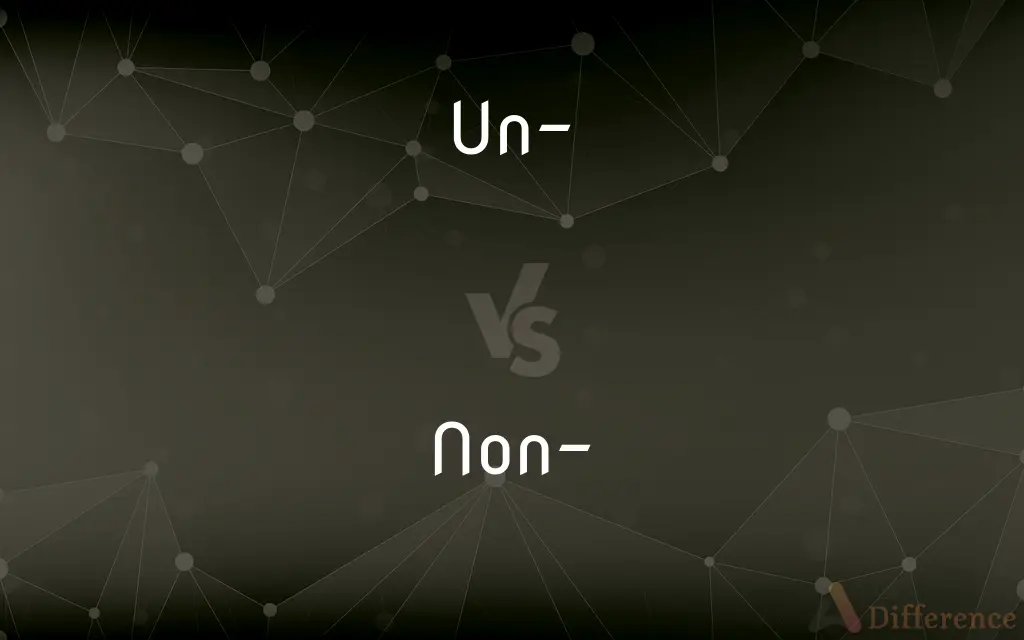Un- vs. Non- — What's the Difference?
Edited by Tayyaba Rehman — By Fiza Rafique — Published on December 14, 2023
"Un-" and "Non-" are prefixes in English that generally indicate negation; however, "Un-" often suggests a reversal of a situation, while "Non-" denotes absence or lack of a quality.

Difference Between Un- and Non-
Table of Contents
ADVERTISEMENT
Key Differences
"Un-" is a prefix that primarily signals a reversal or opposite of a particular condition or state. When attached to adjectives, verbs, or nouns, it frequently conveys the idea of negating the base word or converting it to its opposite. On the other hand, "Non-" is a prefix that underscores the absence or lack of a certain quality, condition, or characteristic.
Using "Un-" often suggests that a situation or condition can be reversed. For instance, "undo" implies that an action can be taken back. In contrast, "Non-" is more absolute in its negation. For example, "nonexistent" indicates that something does not exist at all.
"Un-" can also indicate a lack of ability or a deficiency in some cases. For instance, "unable" implies a lack of capacity. On the flip side, "Non-" typically denotes something that's categorically outside a group or type, such as "nonhuman," indicating entities not part of human beings.
While both "Un-" and "Non-" serve to negate, their usage varies based on tradition, sound, and specific meaning. Words with these prefixes have established conventions that may not always align with the general tendencies of each prefix.
Comparison Chart
General Meaning
Reversal or opposite of a condition/state
Absence or lack of a quality or condition
ADVERTISEMENT
Examples
Unhappy, undo, unaware
Nonprofit, nonhuman, nonstop
Indication
Can suggest a state can be reversed
More absolute negation
Usage
Common with adjectives and some verbs
Broad usage with nouns, adjectives, verbs
Sound Preference
Often preferred for words of Germanic origin
Often used with words of Latin origin
Compare with Definitions
Un-
"Un-" indicates a deficiency or lack of capability.
Unable means not able.
Non-
"Non-" negates the meaning of nouns, indicating lack of affiliation.
Nonmember means not a member.
Un-
"Un-" suggests a reversal of a verb's action.
Undo means to reverse what was done.
Non-
"Non-" denotes the absence of a characteristic.
Nonexistent means not existing.
Un-
"Un-" implies a lack of awareness or knowledge.
Unaware means not aware.
Non-
"Non-" indicates something outside a particular group or category.
Nonhuman means not human.
Un-
"Un-" negates the meaning of an adjective.
Unhappy means not happy.
Non-
"Non-" suggests a complete absence of a quality.
Non-toxic means not toxic at all.
Un-
"Un-" can also denote something that's not in a certain condition.
Uncooked means not cooked.
Non-
"Non-" can denote continuous or uninterrupted actions or states.
Nonstop means without stopping.
Un-
An organization of independent states formed in 1945 to promote international peace and security
Non-
Obsolete form of none
Non-
A non-Muslim citizen.
Common Curiosities
Does "Non-" indicate a complete absence of a trait?
Yes, "Non-" typically denotes a complete absence or lack of a quality, like "nonexistent."
Can "Un-" suggest reversibility?
Yes, "Un-" often suggests a reversal, as in "undo" or "untie."
Which prefix, "Un-" or "Non-", is used with adjectives?
Both can be used with adjectives, but "Un-" is more common, as in "unhappy."
Is "unreal" the same as "nonreal"?
No, they have different nuances. "Unreal" often means surreal or astonishing, while "nonreal" would mean not real or fictitious.
Are there sound preferences when choosing between "Un-" and "Non-"?
Yes, "Un-" often pairs with words of Germanic origin, while "Non-" pairs with words of Latin origin.
Is "Un-" used with verbs?
Yes, especially when suggesting a reversal of action, like "undo" or "unsettle."
What do the prefixes "Un-" and "Non-" generally indicate?
Both "Un-" and "Non-" indicate negation, but their specific uses and implications can differ.
Are there exceptions to the rules for "Un-" and "Non-"?
Yes, English has exceptions, and word usage can be based on tradition and convention.
Can "Non-" be used with nouns?
Yes, "Non-" can negate nouns, like in "nonmember" or "nonissue."
Can both prefixes be used interchangeably?
Not always. Their use is often based on convention, sound, and specific meaning.
What's an example of "Un-" suggesting a deficiency?
"Unable" is an example, meaning lacking the ability.
How does "Non-" differ in meaning from "Not"?
"Non-" is a prefix denoting absence or lack, while "Not" is an adverb negating a verb or adjective.
Is "Un-" always negative?
While "Un-" is often negative, in contexts like "unfold" or "unpack," it suggests a revealing or opening.
Why can't we always replace "Un-" with "Non-" or vice versa?
The choice between "Un-" and "Non-" is often based on sound, convention, and nuanced meaning differences.
Can "Non-" suggest continuous action?
Yes, as in "nonstop," which means without interruption.
Share Your Discovery

Previous Comparison
ArrayList vs. LinkedList
Next Comparison
Rubber Wood vs. HardwoodAuthor Spotlight
Written by
Fiza RafiqueFiza Rafique is a skilled content writer at AskDifference.com, where she meticulously refines and enhances written pieces. Drawing from her vast editorial expertise, Fiza ensures clarity, accuracy, and precision in every article. Passionate about language, she continually seeks to elevate the quality of content for readers worldwide.
Edited by
Tayyaba RehmanTayyaba Rehman is a distinguished writer, currently serving as a primary contributor to askdifference.com. As a researcher in semantics and etymology, Tayyaba's passion for the complexity of languages and their distinctions has found a perfect home on the platform. Tayyaba delves into the intricacies of language, distinguishing between commonly confused words and phrases, thereby providing clarity for readers worldwide.












































